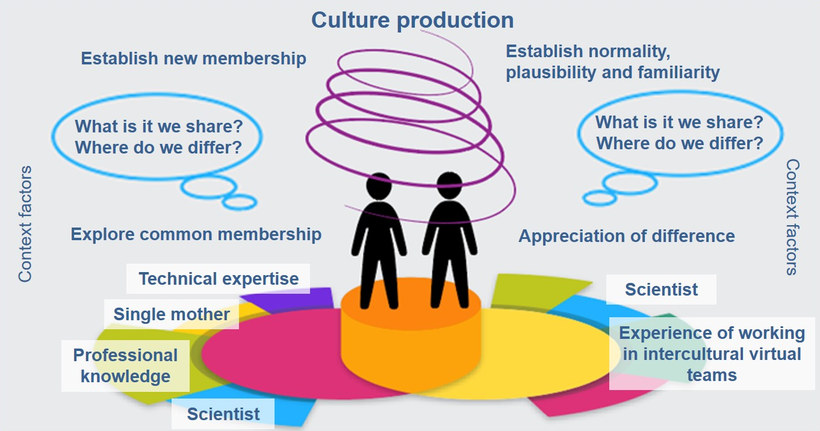Now that the differences in the team are known and understood, the last phase is to manage them. Lane et al (2019) refer to this as integration. And this is where the production of culture takes place. Calling this step 'negotiating culture' or 'creating mutuality', underlines the fact that culture production does not just happen but is a process of indirect or direct negotiation. The following quote is testament to this:
"One of my team colleagues was never on time for our online meetings, which started to be really annoying. Once I asked her why and she told me that it is her understanding that being somewhat late is a sign of politeness. So, after some discussions about time and politeness we agreed that we would use the first ten minutes of our team meetings as social time so that everyone could join without being stressed out but that when I announce a meeting starting ‘at my time’ it is perceived as a matter of urgency to acknowledge clock time."
Source: Learning journal, 2020
Negotiating culture needs to be understood as a process, whose particular outcomes are not known in advance and which is ideally based on dialogue, mutual respect and openness with the purpose of achieving a common goal. Negotiate is, as Brannen (1998, p. 12) argues "...used as a verb to encourage us to think of organizational phenomena as individual actors navigating through their work experience and orienting themselves to their work settings". What this quote brings out quite clearly is that the production of culture is an active process.
The term 'navigating' indicates that negotiations do not take place in a vacuum but that actors consciously or unconsciously take or are forced to take contextual determinants into account. These could be for example, the balance of power between team members and the organisation in which they work, the balance of power and influence among team members themselves, the a priori knowledge and experience of intercultural teamwork, the complexity of team relations and existing knowledge of cultural specifics. As Brannen and Salk (2000) argue, structural, situational and process related factors influence and affect the outcome of the negotiation process and thus what will be maintained, and what will be modified and blended in order to create specific situational work routines and practices.
The image below illustrates the process of 'culture production'. It shows membership of different collectives. Some of these are more relevant to teamwork than others. The illustration shows the influence of contextual factors on the negotiation process and the aim of creating mutuality and thus developing a team culture by establishing normality, plausibility and familiarity.

Source: Based on and inspired by Rathje, Stefanie (2015). Multicollectivity – It changes everything. Key Note Speech at the SIETAR Europe Congress (SIETAR_slides_Rathje.pptx (stefanie-rathje.de). Accessed 24 May 2021.
Figure by Julia Flitta (www.julia-flitta.com)
When entering into the process of negotiating culture, there are basically five options. One would be to divide the tasks within a team in such a way that no adaptation is required. Or, one group might adapt to the other, meaning that one party modifies its behaviour. Alternatively, both groups could find a compromise, whereby both parties reduce their demands or change their approach in order to agree on procedures and meet mid-way. A further option would be for both parties to develop a completely novel approach and thus integrate new, effective and mutually acceptable rules and behaviours within the context of the team’s interactions. Such processes are commonly called a ‘third culture’, emphasising the fact that such a culture develops out of the interaction between two individuals with different cultural backgrounds.
Task: A common path
"At the very beginning it was quite hard to find and follow a common path. None of us wanted to move away from their position, but at the same time none had a proper idea, which made it so hard to put it all together. During this time, I recognised how important it is to take a step back, rethink my own position and open it up for others to join, move or discuss. Therefore, I involve myself in their areas of expertise to get a deeper idea about what was going on. When I did so, I was able to understand their point of view, saw connections and managed to readjust my position in order to achieve our goal."
Source: Learning journal, 2020
Think about a situation in which you and others developed a novel approach to something.
The aim of cultural production and negotiation is the synchronisation of incompatible interaction routines. In other words it is the development of mutually agreed interaction routines that every team member feels comfortable with. This is based on an understanding of interculturality as a dynamic process involving the emergence and conscious development of a common culture. Based on the interplay of action, reaction and adaptation, negotiation is something which is always ongoing, but can also be initiated purposefully during the forming stage of the team development process.